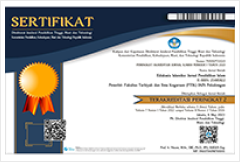Transforming Islamic Education Through Maslahah Mursalah Perspective: Innovation of Islamic Religious Education Books with Disaster Awareness to Enhance Madrasah Resilience
DOI:
https://doi.org/10.28918/jei.v9i1.7421Keywords:
Islamic Religious Education, Disaster Mitigation, Maslahah MursalahAbstract
The approach of disaster mitigation in Islamic religious education urgently needed to be adopted due to the high frequency of disaster occurrences and their impact on madrasahs, particularly in disaster-prone areas. The lack of literature and practical guidelines on disaster mitigation education is one of the main obstacles that reduces madrasah's involvement in disaster risk reduction efforts. This study aims to identify the concept of Islamic education transformation in disaster awareness and the form of innovation in Islamic religious education textbooks based on the perspective of Maslahah Mursalah. Utilizing a Systematic Literature Review (SLR) approach, the research findings highlight: (1) The concept of Islamic education transformation in disaster awareness from the perspective of Maslahah Mursalah focuses on three levels of maslahah: (a) al-Maslahah al-Dharuriyat, where education emphasizes a deep understanding of Islamic teachings related to self-protection and social responsibility in disaster situations, (b) al-Maslahah al-Hajiyat, ensuring the availability of facilities and environments that support effective learning related to disasters, (c) al-Maslahah al-Tahsiniyat, education emphasizes the formation of student character with values such as mutual assistance, cooperation, and empathy in facing disasters. (2) The innovation of Islamic religious education textbooks based on disaster with the perspective of Maslahah Mursalah includes the incorporation of Islamic laws related to disasters into the curriculum with an emphasis on relevance and flexibility, emphasizing the relevance and flexibility of the curriculum, using case studies from Islamic history, and providing practical resources such as evacuation guides in preparing students to face disasters. This research contributes to understanding and implementing disaster risk reduction policies in Islamic religious education, the development of interdisciplinary-based disaster textbooks, and the study of Islamic education materials with the perspective of disaster mitigation based on Maslahah Mursalah.
References
ksa, F. I. (2020). Islamic perspectives in disaster: An alternative to changing fatalistic attitudes. Jamba: Journal of Disaster Risk Studies, 12(1), 1–4. https://doi.org/10.4102/JAMBA.V12I1.942
Alfred, D., Chilton, J., Connor, D., Deal, B., Fountain, R., Hensarling, J., & Klotz, L. (2015). Preparing for disasters: Education and management strategies explored. Nurse Education in Practice, 15(1), 82–89. https://doi.org/https://doi.org/10.1016/j.nepr.2014.08.001
Anafiah, S., & Rezkita, S. (2019). Empowering Disaster Mitigation Learning With E-Books in The Disaster School (SSB) Yogyakarta City. Proceedings of the 1st International Conference on Science and Technology for an Internet of Things, 1–7. https://doi.org/10.4108/eai.19-10-2018.2282167
Azis, A. (2017). Humanisme Dalam Pendidikan Islam: Konsepsi Pendidikan Ramah Anak. Jurnal Pendidikan Agama Islam (Journal of Islamic Education Studies), 5(1), 94. https://doi.org/10.15642/jpai.2017.5.1.94-115
Baidhawy, Z. (2015). The role of faith-based organization in coping with disaster management and mitigation Muhammadiyah’s experience. Journal of Indonesian Islam, 9(2), 167–194. https://doi.org/10.15642/JIIS.2015.9.2.167-194
Bakti, I. K., Abu Bakar, M. Y., & Fuad, A. Z. (2023). Integrasi pengurangan risiko bencana dalam pembelajaran pendidikan Islam: kajian transdisipliner. Jurnal Pendidikan: Riset & Konseptual, 7(2), 225–235.
Bali, M. M. E. I., & Susilowati, S. (2019). Transinternalisasi Nilai-Nilai Kepesantrenan Melalui Konstruksi Budaya Religius Di Sekolah. Jurnal Pendidikan Agama Islam, 16(1), 1–16. https://doi.org/10.14421/jpai.jpai.2019.161-01
Budiana, Sujatnika, A., Nasrudin, A., Nurhakim, M. S., Tinggi, S., Islam, A., Manshur, S., Tinggi, S., Islam, A., Hidayah, N., Tinggi, S., Islam, A., & Pandeglang, B. (2023). Mitigasi Kebencanaan Dengan Pendekatan Nilai Pendidikan Islam di Kalangan Milenial Daerah Pesisir Pantai Labuan Pandeglang , Indonesia. Edukasi Islami: Jurnal Pendidikan Islam, 12(1), 1105–1120.
Camelia, F. (2020). Analisis Landasan Ilmu Pengetahuan dan Teknologi dalam Pengembangan Kurikulum. SAP (Susunan Artikel Pendidikan), 5(1). https://doi.org/10.30998/sap.v5i1.6474
Chester, D. K., Duncan, A. M., & Dhanhani, H. A. G. (2013). Volcanic Eruptions, Earthquakes and Islam. Disaster Prevention and Management: An International Journal, 22(3), 278–292. https://doi.org/10.1108/DPM-04-2013-0079
Chowdhury, M. (2016). Emphasizing Morals, Values, Ethics, and Character Education in Science Education and Science Teaching. Malaysian Online Journal of Educational Sciences, 4(2), 1–16.
Danarta, A. (2022). The Implementation of Disaster Mitigation based on Qur’anic Interpretation: Muhammadiyah Case Study. Jurnal Studi Ilmu-Ilmu Al-Qur’an Dan Hadis, 23(1), 125. https://doi.org/10.14421/qh.2022.2301-07
Efendi, N., & Sholeh, M. I. (2023). Dinamika Sosial Dalam Proses Pengambilan Keputusan dalam Manajemen Pendidikan Islam. Attanwir : Jurnal Keislaman Dan Pendidikan, 14(2), 45–67. https://doi.org/10.53915/jurnalkeislamandanpendidikan.v14i2.421
Fahm, A. G. O. (2019). Islam And Disaster Management In Contemporary Times: A Psycho-Socio-Spiritual Response. Journal of Religion and Spirituality in Social Work, 38(3), 259–280. https://doi.org/10.1080/15426432.2019.1632246
Fatimahsyam, Shadiqin, S. I., & Rahman, A. (2018). Islam And Disaster: A Refined Concept Through Community’s Disaster Perception Of Post The 2004 Indian Ocean Tsunami. Humanities and Social Sciences Reviews, 6(3), 16–21. https://doi.org/10.18510/hssr.2018.633
Firman, Gazalin, J., & Wijaya, A. A. M. (2023). Program Pembelajaran Mitigasi Bencana Kebakaransejak Usia Dinipada Dinas Pemadam Kebakaran Dan Penyelamatan Kota Baubau. Jurnal Inovasi Penelitian, 4(1), 23–36.
Iskandar, I. (2022). Pengembangan Strategi Dalam Menyampaikan Pesan Dakwah Melalui Seni Dan Budaya: Memahami Penyampaian Nilai-Nilai Islam Melalui Kesenian. Etika: Journal of Islamic Communication and Broadcasting Science, 1(2), 57–66. https://jurnalsains.id/index.php/etika/article/view/71
Kristian, I., & Setyasih, E. T. (2023). Urgensi Memasukan Kurikulum Bencana Di Semua Level Pendidikan Di Indonesia. Jurnal Ilmu Sosial, 21(1), 1–6. http://jurnaldialektika.com/
Maksum, M. (2022). Implementation of Al-Ghazali Maslahah Concept In Islamic Economic Activities. SALAM: Jurnal Sosial Dan Budaya Syar-I, 9(2), 481–490. https://doi.org/10.15408/sjsbs.v9i2.24825
Manek, A. H. (2023). Literasi Bencana Dalam Pembelajaran Geografi Pada Kurikulum Merdeka Belajar. Jurnal Samudra Geografi, 6(2), 139–144.
Miresmaeeli, S. S., Esmaeili, N., Sadeghi Ashlaghi, S., & Abbasi Dolatabadi, Z. (2021). Disaster Risk Assessment Among Iranian Exceptional Schools. Disaster Medicine and Public Health Preparedness. https://doi.org/10.1017/dmp.2020.425
Muksana Pasaribu. (2014). Maslahat Dan Perkembangannya Sebagai Dasar Penetapan Hukum Islam. Jurnal Justitia, I(4), 350–360.
Nantara, D. (2022). Pembentukan Karakter Siswa Melalui Kegiatan di Sekolah dan Peran Guru. Jurnal Pendidikan Tambusai, 6, 229–238. https://jptam.org/index.php/jptam/article/view/3267%0Ahttps://jptam.org/index.php/jptam/article/download/3267/2742
Nofialdi. (2009). Maqasid Al-Syari’ah dalam Perspektif Syatibi. Al-Fikra: Jurnal Ilmiah Keislaman, 8(1), 125–155. https://doi.org/http://dx.doi.org/10.24014/af.v8i1.3807
Nur Aulia, R., M. Jasin, F., Anggraeni, D., Mardhiah, I., & Hadiyanto, A. (2020). Environmental Managemen Model in Coastal Area (Case Study of Ekopesantren al-Khairat Palu Sulawesi Tengah). In International Conference on Global Resource Conservation (ICGRC). Malang: International Conference Partner. https://doi.org/10.11594/nstp.2019.0301
Nurfalah, Y. (2018). Penanaman Nilai-nilai Pendidikan Agama Islam Terhadap Anak. Tribakti: Jurnal Pemikiran Keislaman, 29(1), 96. https://doi.org/https://doi.org/10.33367/tribakti.v29i1.567
Nurulloh, E. S. (2019). Pendidikan Islam dan Pengembangan Kesadaran Lingkungan. Jurnal Penelitian Pendidikan Islam, 7(2), 237. https://doi.org/10.36667/jppi.v7i2.366
Petal, M. A., & Izadkhah, Y. O. (2008). Concept Note: Formal and Informal Education for Disaster Risk Reduction. International Conference on School Safety, May.
Purnomo, & Solikhah, P. I. (2021). Konsep Kurikulum Pendidikan Islam Berbasis Ketahanan Bencana. Jurnal Pendidikan Agama Islam Al-Thariqah, 6(2), 378–394. https://doi.org/10.25299/al-thariqah.2021.vol6(2).8054
Rosyida, F., Wahyuningtyas, N., Tanjung, A., & Kodir, A. (2022). Assessing and preparedness for earthquake disaster in Salaf-Khalaf Islamic Boarding School. IOP Conference Series: Earth and Environmental Science, 1041(1). https://doi.org/10.1088/1755-1315/1041/1/012033
Rubaidi. (2018). Pengarusutamaan Pengurangan Resiko Bencana (PRB) Berbasis Kurikulum Pendidikan Agama Islam. Al-Izzah: Jurnal Hasil-Hasil Penelitian, 13(2), 272. https://doi.org/10.31332/ai.v13i2.1007
Sato, K., Kimura, R., & Ohtomo, S. (2021). Typology of Learning Contents in “Supplementary Textbook for Disaster Prevention Education” – What Are Teachers in The Areas Affected by the Great Hanshin-Awaji Earthquake in 1995, and The Great East Japan Earthquake in 2011, Striving to Teach Students in. Journal of Disaster Research, 16(4), 794–812. https://doi.org/10.20965/JDR.2021.P0794
Seddighi, H., Yousefzadeh, S., López López, M., Sajjadi, H., Vameghi, M., Rafiey, H., & Khankeh, H. (2021). Disaster Risk Reduction in Iranian Primary and Secondary School Textbooks: A Content Analysis. Disaster Medicine and Public Health Preparedness. https://doi.org/10.1017/dmp.2021.161
Susanto, B. W., Lasmiadi, Mualif, A., Wismanto, & Zhafirah, A. (2023). Strategi Guru Pendidikan Agama Islam Dalam Membentuk Akhlak Berkomunikasi Peserta Didik. Jurnal Hikmah, 12(2), 327–337. http://dx.doi.org/10.55403/hikmah.v12i2.567
Suyadi, Nuryana, Z., & Fauzi, N. A. F. (2020). The fiqh of disaster: The mitigation of Covid-19 in the perspective of Islamic education-neuroscience. International Journal of Disaster Risk Reduction, 51, 101848. https://doi.org/https://doi.org/10.1016/j.ijdrr.2020.101848
Wang, J.-J. (2016). Study on the context of school-based disaster management. International Journal of Disaster Risk Reduction, 19, 224–234. https://doi.org/https://doi.org/10.1016/j.ijdrr.2016.08.005























